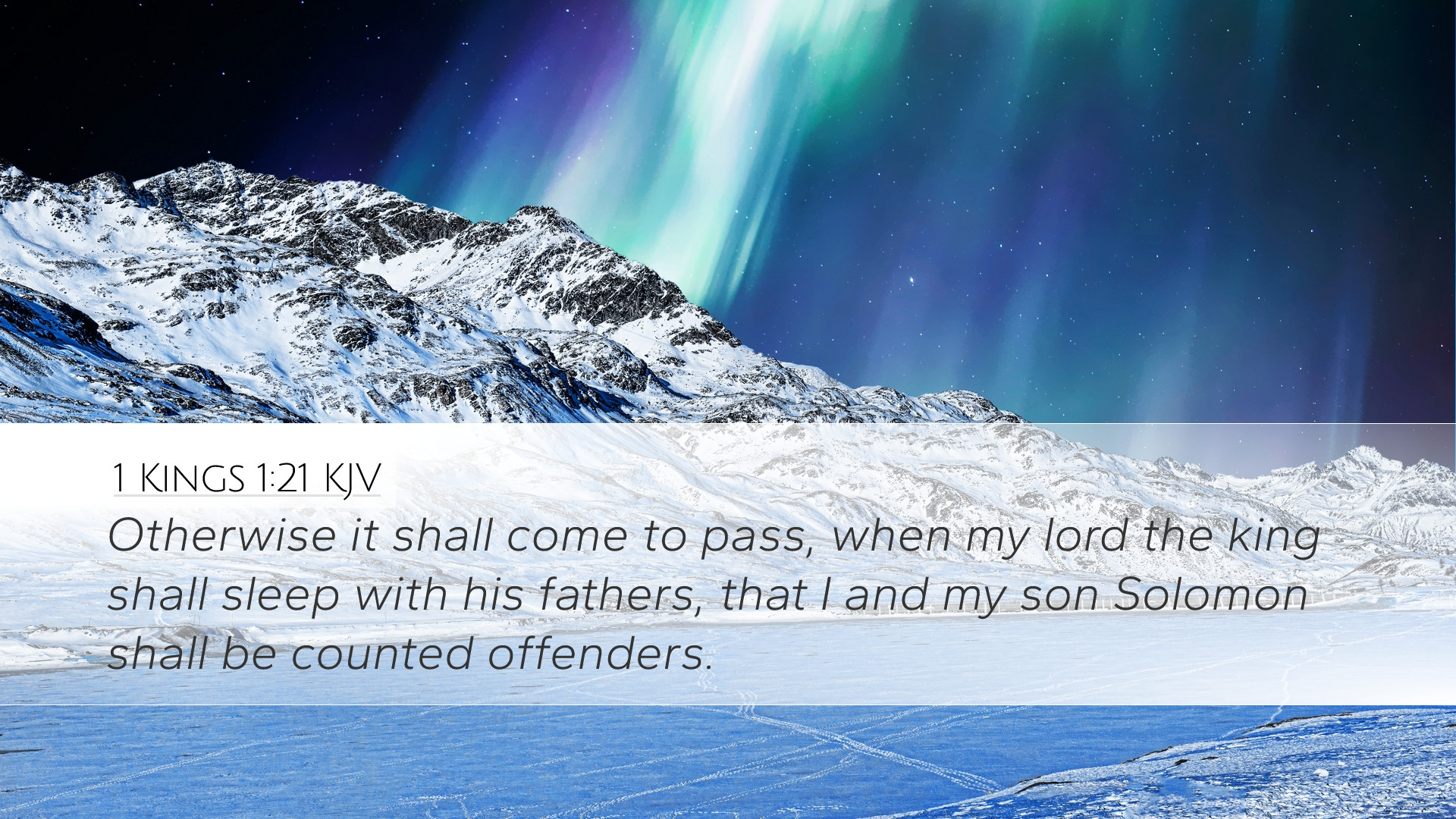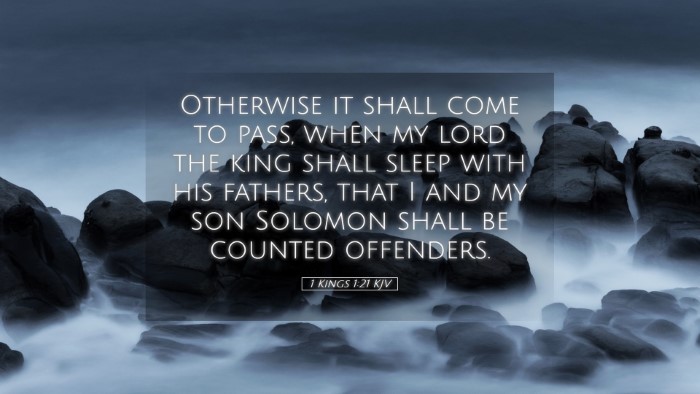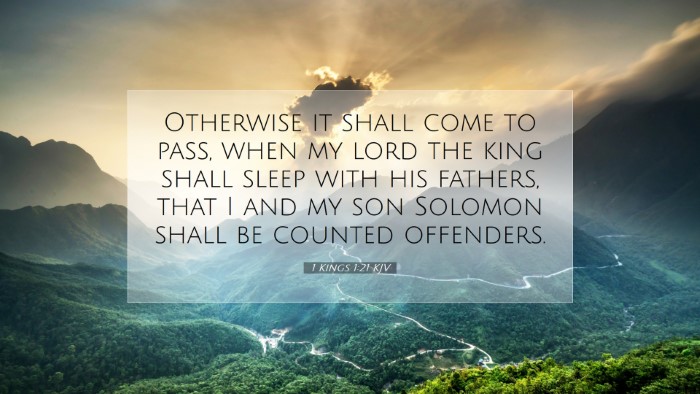Commentary on 1 Kings 1:21
Verse Text: "Otherwise it shall come to pass, when my lord the king shall sleep with his fathers, that I and my son Solomon shall be counted offenders."
This verse is part of a pivotal moment in the history of Israel, as it depicts the political tension surrounding King David's succession. The words of Bathsheba, the mother of Solomon, reveal deep concerns about her and her son's safety in light of Adonijah's claims to the throne.
Insights from Public Domain Commentaries
Matthew Henry’s Commentary
Matthew Henry highlights the significance of this moment in divine providence. Bathsheba's plea illustrates her awareness of the threat posed to Solomon's kingship by Adonijah's actions. Henry emphasizes that Bathsheba's statement reflects a profound understanding of the immediate political landscape.
-
Divine Appointment: Henry sees the appointment of Solomon as part of God's sovereign plan which must come to fruition despite human machinations. Bathsheba appeals to King David not just for political influence but to align with God's will.
-
Fear of Consequences: Bathsheba expresses a genuine concern about the potential consequences of David's death. Her use of the terms "counted offenders" underscores the serious nature of the political treachery during this time.
Albert Barnes’ Notes on the Bible
Albert Barnes provides a detailed analysis of the text's implications for both Bathsheba and Solomon. He notes that her statement indicates the precarious position that they occupy in the royal line, especially in light of Adonijah’s rebellious ascent.
-
Significance of Legacy: Barnes underscores how the legacy of the King affects the next generation. Bathsheba's fear of being "counted offenders" involves both physical and political danger, highlighting the often perilous nature of royal succession.
-
Contrast with Divine Favor: He draws a parallel between human ambition and divine favor, suggesting that while Adonijah seeks to usurp the throne by human means, Solomon's kingdom is ordained by God.
Adam Clarke’s Commentary
Adam Clarke discusses the psychological and emotional dimensions surrounding Bathsheba’s statement. He perceptively notes the weight of fear and anxiety in her plea, depicting a mother who is acutely aware of the dangers around her son.
-
Mother’s Protection: Clarke points out the instinctive nature of a mother’s concern for her child's safety, reflecting a theme prevalent throughout scripture where mothers often play crucial roles in the lives of future leaders.
-
The Threat of Rebellion: There is an implicit acknowledgment of the rebellion that Adonijah represents; his actions are not mere political maneuvers but threats that could lead to severe consequences for not just Solomon, but for Bathsheba and the broader kingdom.
Theological Reflections
The discussion surrounding 1 Kings 1:21 offers significant theological insights, particularly regarding God's sovereignty, the role of human agency in history, and the manifestation of divine favor.
-
Sovereignty of God: This passage invites reflection on the sovereignty of God in the affairs of men. The ascending power of Adonijah stands in stark contrast to God's chosen path for Solomon, which serves as a reminder of the ultimate control God has over human events.
-
The Role of Prayer and Intercession: Bathsheba’s plea can be seen as an act of intercession, an initiative taken in faith. This reflects the importance of asking God for guidance and intervention in seemingly hopeless situations.
-
Human Frailty and Divine Purpose: The frailty of human leadership is evident in this narrative. Bathsheba’s fears represent the human concern for safety and stability, yet the assurance of divine purpose persists throughout the turmoil.
Practical Applications for Pastors and Students
As pastors and students engage with this scripture, it serves to remind them of the complex dynamics of leadership, the importance of aligning with God's will, and the perpetual need for vigilance and wisdom in the face of adversity.
-
Encouragement in Transition: The narrative of succession in monarchy can parallel transitions in church leadership, reinforcing the need for a reliance on God’s guidance amid uncertainty.
-
Awareness of Influence: Leaders must be attuned to the motivations and ambitions of those around them, seeking to navigate these dynamics through prayer and wise counsel.
-
Reliance on God: This passage is an invitation to trust in God’s providential care amidst the fears and uncertainty that accompany leadership roles.
Conclusion
In summary, 1 Kings 1:21 encapsulates a critical moment in the unfolding story of Solomon's divine appointment. Bathsheba’s plea resonates on multiple levels - politically, emotionally, and theologically. The insights drawn from the commentaries of Henry, Barnes, and Clarke not only illuminate the text but also provide invaluable lessons for contemporary readers regarding faith, leadership, and divine sovereignty.


